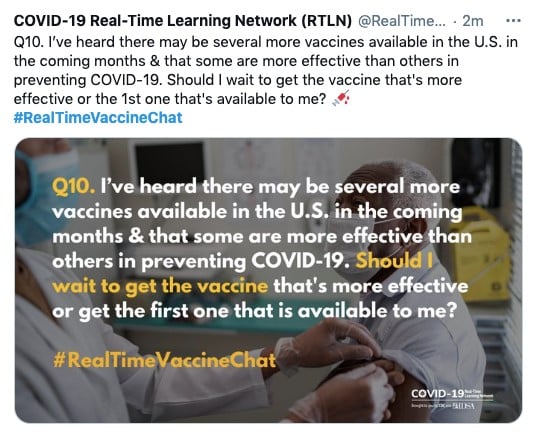Infectious disease and other medical experts address health workers' COVID-19 vaccine questions
Facebook Twitter LinkedIn EmailJust short of a year since the first COVID-19 outbreak and health worker infections were recognized in a Seattle long-term care facility, an online chat Wednesday addressed questions that have been voiced by medical aides, technicians, nurses and others on the frontlines, about vaccination against the disease.
The chat with a panel of infectious diseases specialists and other medical experts, was hosted on Twitter by the Real Time Learning Network, a COVID-19 information resource coordinated by IDSA (which produces this blog), with support from the U.S. Centers for Disease Control and Prevention. It highlighted continuing unknowns about both the coronavirus and the vaccines developed to contain it.
Should pregnant people receive the vaccine? With no vaccine tested in clinical trials on pregnant people, that's a personal choice, based on discussion between patient and doctor, the experts agreed, striking "a balance," one noted, of the known risks of COVID, versus the unknown risks of the vaccine.
Experts also agreed that ongoing efforts to collect information on the impacts of the vaccines among children and preteens with asthma will be helpful.
"I would encourage them to consider participating in a trial if one is available," one of the panelists responded.
More information on the vaccines' role in preventing transmission also will be helpful in guiding decisions, they agreed.
But as one noted, "As a health care provider, to me it is important to not be a possible source of infection for my patients. Accordingly, I will continue social distancing and compulsive masking (along with hand-washing) as if I were not vaccinated."
The chat, however, with tweets seen by more than 9 million people, highlighted one certainty, even amidst uncertainty, in responses to this question:
"The most important question of the day!" one doctor responded. "My advice -- get the first vaccine available to you. When you become eligible, get in line. Stopping the pandemic comes down to more people getting vaccinated."
"The bottom line is people should get vaccinated with whatever vaccine is available to them as early as they can," agreed the next responder.
"There are three important factors in deciding which vaccine to get," another weighed in, "1) Which is available? 2) Which is available to you? 3) Which is available to you now?"
"My advice is to get a vaccine as soon as you are eligible, and not worry about which one," urged a fourth, "'If you can't be with the one you love, get vaccinated with the one your with.' Apologies to Steven Stills."



